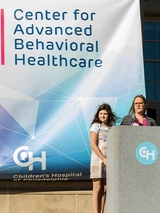Anxiety and ADHD: Molly’s Story
Anxiety and ADHD: Molly’s Story
Molly was struggling in school before March 2020, when COVID-19 upended any sense of normalcy. She was significantly behind in reading and had trouble getting along with her peers, managing her emotions and paying attention. The pandemic made it all worse.

It wasn’t until she was diagnosed with ADHD and anxiety and began receiving treatment at Children’s Hospital of Philadelphia (CHOP) that she began to realize her potential.
“Molly is an amazing human being,” says her mother, Andrea. “She’s funny, smart, cool. Now other people are seeing it.”
Molly and Andrea spoke at the Grand Opening of the Center for Advanced Behavioral Healthcare, a larger, newly renovated space for outpatient appointments for children receiving care from the Department of Child and Adolescent Psychiatry and Behavioral Sciences (DCSPBS). The Chesterfield, N.J., family shared how the new offices at 4601 Market St. enhance the experience of receiving the care Molly needs.
Confluence of events
When Molly’s third-grade class went 100% remote in March 2020, she thought all her classmates also struggled with school. “Everything was distracting me,” Molly remembers. “I thought it was normal. I thought no one else could focus on school, just like I couldn’t focus.”
She also worried constantly. “She was afraid of getting sick; she was afraid of other people getting sick,” Andrea says. “Any anxiety she had before COVID was exacerbated. She was isolated because our family quarantined, and she didn’t have a group of friends going into the pandemic that she could connect with. She cried a lot; she was overwhelmed.”
Molly was overreacting to everyday situations, lacking the maturity to handle typical events — let alone a pandemic. Her “big reactions” and lack of progress in school concerned her parents, who reached out to CHOP.
Evaluation and a plan
Molly was evaluated — virtually since the pandemic was still raging — by Christina Di Bartolo, LCSW, a behavioral health licensed clinical social worker for DCAPBS. It provided a clearer picture of the challenges Molly was facing: attention-deficit/hyperactivity disorder (ADHD), dyslexia and anxiety. Her issues weren’t caused by the pandemic, but pandemic-related stress exacerbated them.
Psychologist Stephon N. Proctor, PhD, ABPP, created a plan to address Molly’s needs in school, which included an Individualized Education Plan (IEP) and an early return to in-person class.
Progress followed. Anne B. Kearney, MSN, CRNP, PMHNP-BC, one of CHOP’s board-certified psychiatric-mental health nurse practitioners, also joined the team and helps manage Molly’s medication.
“Annie is really nice and easy to talk to,” Molly says. “She has a kind way about her. She has a personality where you can be really open with her. I like having conversations with her about my ADHD and anxiety. She finds ways to help me. She talks to me and listens to me to find what best fits me. The best part of coming to CHOP is I know everyone here is here to help me.”
Light, bright, spacious location

Since Molly’s appointments have shifted to the new Center for Advanced Behavioral Health, the experience is more relaxing. There are multiple waiting rooms, with specific areas close to the clinicians’ offices/treatment rooms so when Molly is in with Kearney, Andrea is nearby, for example.
Giant windows let in tons of natural light, and throughout the space — which is about double the size of its former location — distinct murals showcase what makes Philadelphia special.
“I really like this new building,” Molly says. “It has bright colors and fun sensory pods where I can play while waiting or my mom is talking.”
Andrea says, “Expansion comes at a very important moment. The past few years have been challenging for everyone, especially our children. It’s crucial for kids like Molly who are trying to find their best possible selves.”
Gaining confidence
Reading is still difficult for Molly, but text-to-speech software is a big help. “Molly is a very, very curious child who asks a lot of questions. But because she couldn’t read well, she couldn’t get the information she needed, which was upsetting for her. Now, she can find answers in a way she can comprehend,” Andrea says.
The medication is helping her with focus and lessening the anxiety. “She had been so frustrated before, knowing that she was capable of doing the work but not being able to keep up. Now, with the medicines, therapy and accommodations at school, she can,” Andrea says. “Her concentration in class is improving, and she’s doing better socially. I’m seeing Molly get her confidence back.”
That confidence is also showing up in the swimming pool. Molly, now 11, has swum competitively for five years, and since receiving treatment at CHOP, she has consistently improved her times.
“We just had a meet, and I set a personal best,” she says proudly.
Molly’s engaging, boisterous personality is also back. “She used to have tons of energy and was always saying funny things,” Andrea says. “During the pandemic, she had become withdrawn. The stress of COVID sped up the problems she had.
“She is so much happier now. We can see the difference on her face.”